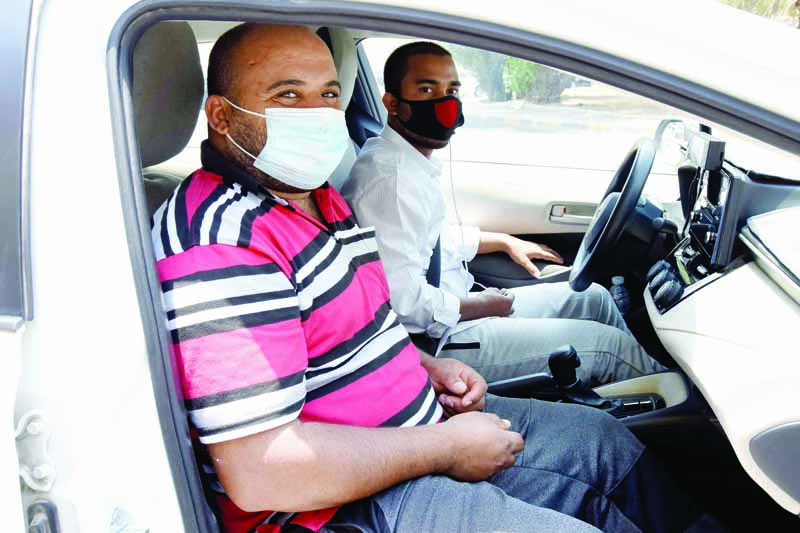
By Sajeev K Peter
KUWAIT: Taxi driver Imthias Hussain had high expectations when he returned to the road after the government lifted a four-month-long lockdown on taxis on July 28. But a flurry of private vehicles transporting people up and down for a 'consensual fare' dashed his hopes and upended his livelihood. While hundreds of illegal taxis, camouflaged as private vehicles, carry three passengers, licensed taxis can carry only one passenger at a time amid coronavirus restrictions.
"I had high hopes when I took my taxi out after a gap of four months. But to my dismay, I found that people are wary of hiring a taxi these days amid virus fears, especially families, as they cannot travel in one vehicle," said Hussain, a Pakistani expat who has been a taxi driver in Kuwait for the last 15 years.
Many other roaming taxi drivers who ply on Kuwait's roads also echoed despair and frustration as they grapple with a bitter post-lockdown reality. They feel that illegal taxis are stealing their livelihoods. Now, as buses are back on the streets, the plight of taxi drivers has become even more compounded.
As part of lockdown restrictions, the government suspended public transport buses on March 18 and taxis on March 22. Hundreds of people, who till then depended on buses and taxis for commuting to and from workplaces, began to rely on private vehicles for transportation under a partial curfew. Many taxi drivers believe that the official ban on licensed transportation services paved way for the mushrooming of an illegal private taxi network in the country.
"They are flourishing now because private vehicles can take up to three passengers at a time. Even families go for private taxis because they prefer to travel together," said Manoj Madathil, an Indian taxi driver. According to Madathil, the post-lockdown scenario presents an uncertain future for taxi drivers in Kuwait.
A driver who pays a rental fee of KD 7 or KD 8 a day to his company will not be able to make a living with the job today when the one-passenger rule is in force. He hoped the authorities would soon lift the rule, which could improve the plight of taxi drivers. Luckily, some taxi owners are not insisting on the daily rent now, he added.
Several taxi drivers expressed hope that the authorities would take measures to stop the plying of illegal private taxis in the country so that licensed taxi drivers would feel secure. Most of the cabbies - who endured a harrowing time during the lockdown without work and money - spoke to Kuwait Times of their misery, sacrifices and fears for the future.
Some who had their families here sent them to their home countries, while others resorted to taking up menial jobs like food delivery or restaurant catering to earn a living. Partially offsetting their misery, most taxi owners had exempted their drivers from paying the daily rent during most of the lockdown period.
Rajamanikkam, an Indian taxi driver, said he had to depend on his wife Muthulakshmi's salary when he became jobless during the lockdown. Muthulakshmi, a domestic servant, has been working as a cook at a restaurant in Salmiya during the last two months of the lockdown.
Youseff, an Egyptian expat driver, said he has decided to leave Kuwait for good as he cannot support his family with a taxi driver's job now. "Probably, I could make around 10 or 12 dinars a day if I roam the streets until 8 pm. But what is left after paying the daily rent of KD 7, petrol charges and maintenance or repair costs?" he asked. According to some estimates, around 10,000 roaming taxis and 5,000 call taxis are plying on Kuwaiti roads, in addition to a few hundred orange taxis and airport taxis.
More than 50 owners representing taxi companies held protests outside the interior ministry's headquarters in Subhan last week against the decision to ban taxis from serving more than one passenger at a time, according to media reports. They demanded that the decision be scrapped as it had caused substantial losses to their businesses, the reports added.
.jpg)
